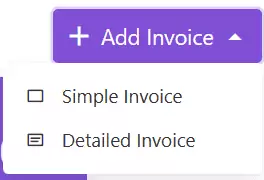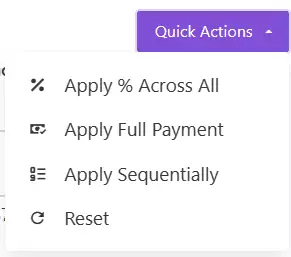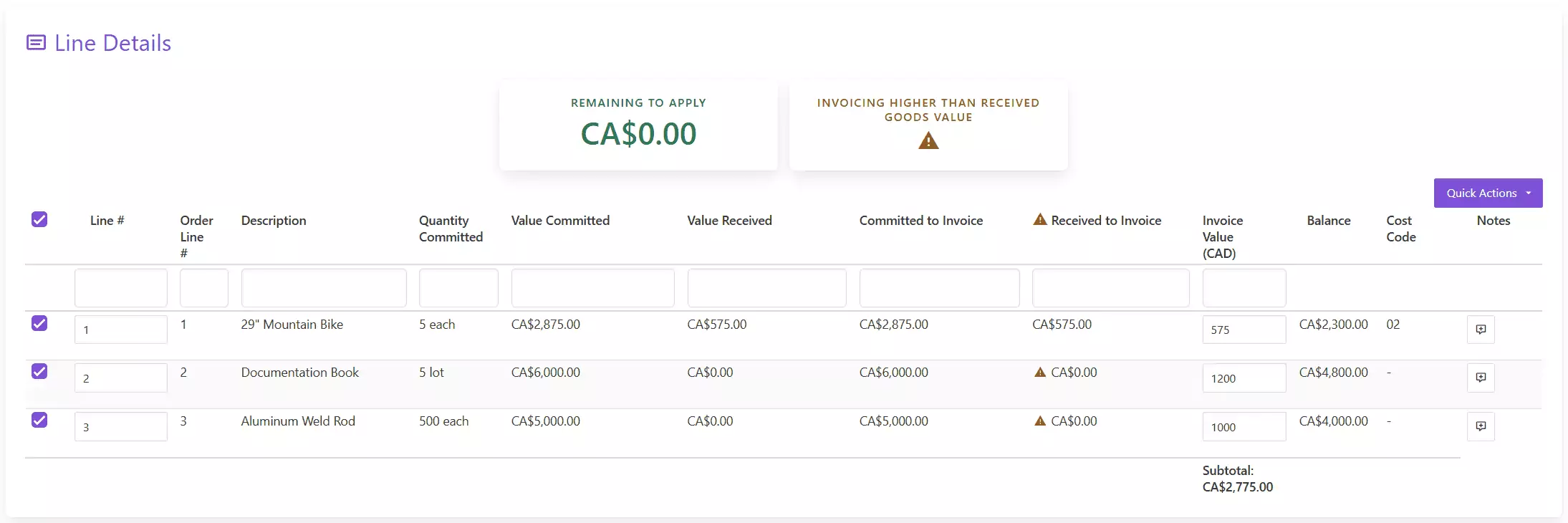We are excited to announce we have launched enhanced invoicing functionality within Current SCM! The system now supports tracking and cost allocations at the line-level (of the Purchase Order, Service Order). In addition, we have launched an approval workflow to support the invoice attestation process.
Simple or Detailed, You Can Choose:
Current SCM supports both a simple, and detailed process for tracking invoices:
- Simple Invoices: The simple method does not track invoicing at the line level, only against the overall order. This is a good use case where your organization would like to move rapidly and do not require a more structured process.
- Detailed Invoices: This method supports allocating value of invoices towards specific (or all lines). This type of invoice allows for semi-automated invoice attestation by automatically highlighting cases where invoice amounts exceed the value of the received goods or services, or where invoice amounts exceed the commitment.

Advantages of Detailed Invoicing:
- Less chance of overpayment: The system can essentially handle your approvals short of pressing the approve button. It will advise the reviewer of any lines where the invoiced amount exceeds the committed (agreed) value, or where the invoice intends to pay for more than the value of the goods received in the system. This facilitates receipt matching which is a critical control point.
- Improved Reporting / Budgeting: By tracking invoicing at the line level the system will be able to report in far more granularity. You will have line of sight of the planned, committed, and invoiced cost at the line level, and through roll up to the general ledger account (cost code). This will allow procurement managers to make more informed decisions as the project evolves.
- Faster dispute resolution: In case of any invoicing discrepancies or disputes, tracking invoicing at the line level allows for faster resolution. The system can easily identify the specific line item in question and facilitate communication between the purchaser and supplier to resolve the issue.
Quick Actions:
While the additional data provided by tracking detailed invoices is extremely valuable, we wanted to ensure we wanted to minimize the data-entry burden on our users. With that in mind we have add a number of helpers to automate the allocation of the invoice value against the lines:

Percent Invoicing
This action will apply a specified percentage across all lines. This is useful for milestone payments, or deposits.
Full Payment Invoicing
Automatically pay only the unpaid value against the committed value of the order.
Sequential Invoicing
The total invoice value will be applied sequentially to lines items (against their commitments) until their balance reaches zero or the remaining amount reaches zero.
Invoice Attestation
Invoice attestation refers to the process of verifying and approving invoices before they can be paid. It is an important step in the procurement process to ensure that vendors are paid accurately for the goods or services they have provided, and that the payment is approved by the appropriate personnel within the organization.
The invoice attestation process involves a review of the invoice to ensure that the goods or services have been received and meet the specifications of the purchase order. Once the review is complete, the invoice is forwarded to the appropriate approver, who verifies that the invoice is accurate and approves it for payment.

The invoice attestation process helps to prevent errors and fraud, and ensures that vendors are paid in a timely and accurate manner. It also provides an important record of transactions that can be used for auditing and reporting purposes.
New Reporting
Our new Order Items Invoicing Report provides a project-wide look at the invoice status at the line level to help your team keep on top of its commitments and ensure control, and accurate cost projections.

The Current SCM team is really excited to get this functionality into the hands of our users. We feel the ability to support in application invoice attestation will further enhance Current SCM as the best procurement system for project based organizations.
Engaged in Complex Procurement?
Let’s face it, not all procurement is created equal. There’s a world of difference between ordering office supplies and purchasing materials and services with sophisticated technical requirements or managing the procurement for complex industrial projects or expediting materials from vendors across the globe.
Complex procurement demands more than standard solutions.
Current SCM is a cloud-based software-as-a-service (SaaS) that was purpose-built for complex procurement. We were born from the real-world experience of a leading industrial engineering firm who couldn’t find a procurement system that met their complex needs. So, they built their own.
Current SCM was explicitly designed to reduce errors between Engineers & Buyers by ensuring procurement professionals have access to the resources they need, including centralized procurement catalog(s), centralized procurement documentation, and centralized vendor management.
Current SCM encompasses activities that occur outside of the typical procure-to-pay process, and offers robust toolsets to support project procurement, third party procurement, technical procurement, and strategic procurement.
Current SCM provides a unified platform for procurement and materials management, offering comprehensive support for the planning, purchasing, and management of materials & services. With material and document tracking integrated into the Order and an Expediting dashboard within each Order, Current SCM provides a unique platform for Buyers and Expeditors.
And Current SCM was designed to drive collaboration among all procurement stakeholders.
Experience the difference. Contact Current SCM today to streamline your complex procurement processes.
